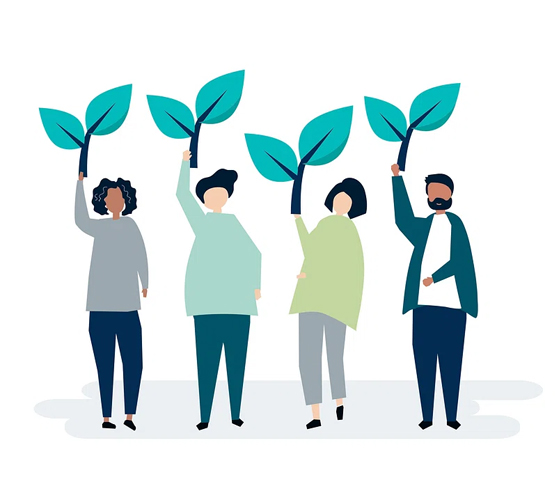We deserved to access social entitlements
In facilitation of HELP, VIMUKTHI (A State level forum of survivors of trafficking and victims of Commercial Sexual Exploitation) advocated with duty bearers for their social entitlements which resulted in a total of 190 rescued survivors of trafficking and victims of Commercial Sexual Exploitation (CSE)/Sex Workers have accessed 36 ration cards, 103 house pattas, 78 Aadhaar cards, 48 bank accounts and 06 single women/widow pensions even in the absence of necessary identity proofs which are needed to sanction such state support services.
They have submitted a representation to the Chief Minister, Minister – Civil Supplies and also Commissioner – State Public Distribution System exploring their challenges in accessing dry ration without ration cards. As VIMUKTHI sensitised the state level authorities regarding their vulnerability and social stigma and discrimination, the department understood and realised their difficulties and has sanctioned required social entitlements.

Financial literacy & savings – Robust Remedyto Socio-economic empowerment
98 survivors and victims of Commercial Sexual Exploitation joined in 13 Self Help Groups and have accessed bank loans. 10 survivors have started petty businesses such as vegetable selling, tiffin centres, flower stalls, rice shops and so on.
HELP imparted orientations on financial literacy, group dynamics, leadership qualities, noticing merits and de-merits of group and also need and active engagement of members in the group activities, adopting Panchasutras with effective internal functional management of the group. Members of survivor collectives especially who joined in to SHGs have been facilitated with the linkages with the MEPMA (Mission for Elimination of Poverty in Municipal Areas) and DRDA (District Rural Development Agency) which are the nodal agencies for promoting and developing these groups.

Collaboration catalysed in Effective Service Delivery to children
A Total of 4500 children in need of care were outreached both from Institutional and Non-Institutional care and protection services. Prepared and promoted Standard Operating Procedure for CWCs for effective service delivery for child victims of trafficking and other vulnerabilities. Trained 600 police personnel, 30 District Probation Officers, 55 Child Welfare Committee members on Juvenile Justice Act, 2015, Protection Of Children from Sexual Offences Act, 2012 and other associated legislations of Child Protection. Facilitated to re-integrate a total of 1397 children from 3 Govt run Juvenile Homes.
HELP built and strengthened collaboration with Dept. of Women Development and Child Welfare, Police and Judiciary as well as Dept. of Juvenile Welfare and Correctional Services, Govt. of Andhra Pradesh. The collaboration has impacted in strengthening juvenile justice system in the state through improved capacities of Child Welfare Committees and Child Care Institutions.
Trained Youth advocates acted as change agents
HELP has imparted series trainings to 111 Youth group leaders built with their capacities as change agents in prevention of child marriages and child trafficking through promotion of secondary education and job oriented vocational trainings in the state of Andhra Pradesh under Girls Advocacy Alliance (GAA) programme. The trained youth became advocates and sensitized 1430 members of their youth clubs/associations/groups/networks on prevention of child marriages, child trafficking. 4306 community members including parents, boys and girls and community elders, PRI members and Village Level Child Protection Committee members have been sensitised through rallies, public meetings & mass awareness campaigns on occasional days.
45 CSOs joined as part of GAA network and incorporated GAA themes i.e., Child Marriages, Child Trafficking, Secondary Education and Job Oriented Vocational Training in to their work priorities. As an impact of youth advocacy action a total of 42 GAA network NGOs in Andhra Pradesh have reformed their institutional policies and are adopted Child Safety policy and Gender Policy. A total of 373 Govt. officials have been sensitised on the issues of prevention of Child Marriage and Child Trafficking and Promotion of Secondary Education for Girls and Job Oriented Vocational Training for Young Women.
© Copyright 2024, HelpAp
Design & Developed by : Net Linker
